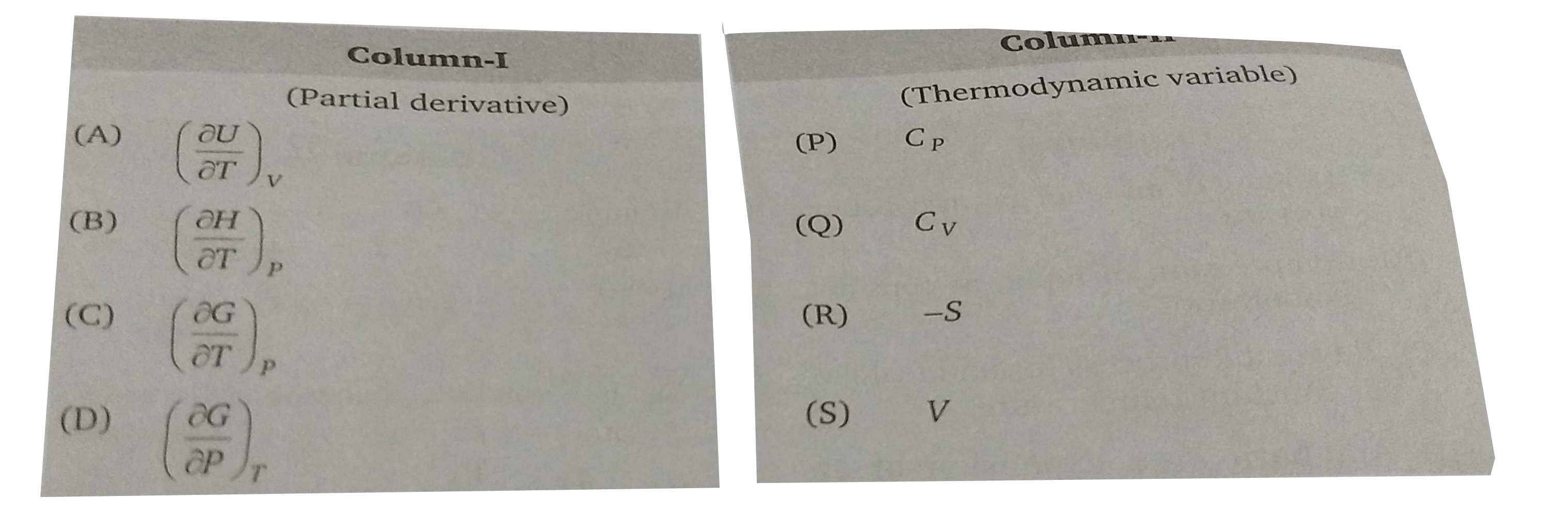Calculate standard entropy change in the reaction
Fe2O3(s)+3H2(g)→2Fe(s)+3H2O(l)
Given :Sm0(Fe2O3,s)=87.4,S∘m(Fe,s)=27.3
S∘m(H2,g)=130.7,S∘m(H2O,l)=69.9JK−1mol−1Solution in Punjabi
−212.5JK−1mol−1
−215.2JK−1mol−1
−120.9JK−1mol−1
None of these
The correct Answer is:B
ΔrS∘=ΣvpS∘(products)−ΣvRS∘(Reactants)
=(2×27.3+3×69.9)−(87.4+3×130.7)
=−215.2 JK−1 mol−1
Topper's Solved these Questions
- THERMODYNAMICSBOOK - NARENDRA AWASTHICHAPTER - THERMODYNAMICSEXERCISE - Level 3 - One Or More Answers Are Correct
1 Videos
- THERMODYNAMICSBOOK - NARENDRA AWASTHICHAPTER - THERMODYNAMICSEXERCISE - Level 3 - Match The Column
2 Videos
- THERMODYNAMICSBOOK - NARENDRA AWASTHICHAPTER - THERMODYNAMICSEXERCISE - Level 2 (Q.1 To Q.30)
1 Videos
- STOICHIOMETRYBOOK - NARENDRA AWASTHICHAPTER - STOICHIOMETRYEXERCISE - Level 3 - Subjective Problems
20 Videos
Similar Questions
Assume ideal gas behaviour for all the gases considered and neglect vibrational degrees of freedom. Separate equimolar sample. Separate equimolar samples of Ne, O2 , CO2 and SO2 were subjected to a two process as mentioned. Initially all are at same state of temperature and pressue.
Step I → All undergo reversible adiabatic expansion to attain same final volume, which is double the original volume thereby causing the decreases in their temperature.
Step → After step I all are given appropriate amount of heat isochorically to restore the original temperature.
Mark the correct option(s) :
View SolutionMatch the following columns

View SolutionWrite structure of 2,2-dimethylheptane.
View SolutionWhat volume of a liquid (in L) will contain 10 mole ? If molar mass of liquid is 280 and its density is 1.4 g/mL.
View SolutionCalculate ΔH at 85∘C for the reaction:
Fe2O3(s)+3H2(g)→2Fe(s)+3H2O(l)
The data: ΔHΘ298=−33.0kJmol−1 and SubstanceFe2O3(s)Fe(s)H2O(l)H2(g)C∘P(JK−1mol)103.025.075.028.0
View SolutionCalculate Delta_(r)S_(m)^(Theta) for the reaction: 4Fe(s)+3O_(2)(g) rarr 2Fe_(2)O_(3)(s) Given that S_(m)^(Theta)(Fe) = 27.3J K^(-1) mol^(-1) , S_(m)^(Theta)(O_(2)) = 205.0J K^(-1)mol^(-1) and S_(m)^(Theta)(Fe_(2)O_(3)) = 87.4 J K^(-1) mol^(-1) .
View SolutionCalculate standard entropy change in the reaction Fe_(2)O_(3)(s)+3H_(2)(g) rarr 2Fe(s)+3H_(2)O(l) Given : S_(m_(0))(Fe_(2)O_(3).S)=87.4,S_(m)^(@)(Fe,S)=27.3 S_(m)^(@)(H_(2),g)=130.7,S_(m)^(@)(H_(2)O,l)=69.9JK^(-1)mol^(-1)
View SolutionFe2O3(s) may be converted to Fe by the reaction
Fe2O3(s)+3H2(g)⇔2Fe(s)+3H2O(g) for which Kc=8at temp . 720∘c.
What percentage of the H2 ramains unreacted after the reaction hascome to equilibrium ?
View SolutionFor the reaction S_(2)O_(3)^(2-)(aq) +2H_(3)O^(+)(aq) hArr S(s)+H_(2)SO_(3)(aq)+H_(2)O(l) Rate =k[H_(3)O^(+)][S_(2)O_(3)^(2-)] Reaction is fastest in
View SolutionNumber of compounds having S-S linkage
H2S2O3,H2S2O78,H2S2O5,H2S4O8,H2S2O4
View SolutionCalculate the standard free energy change for the reaction : Fe_(2)O_(3)(s) + 4H_(2)(g) rarr2Fe(s) + 3H_(2)O(l) Given that the standard free energies of formation of Fe_(2)O_(3) and H_(2)O are - 741.0 and -237.2kJ mol^(-1) respectively.
View SolutionH2S2O6 और H2S2O8 में S का ऑक्सीकरण संख्याओं की गणना करे।
View SolutionThe DeltaH at 358 K for the reaction Fe_(2)O_(3)(g)+3H_(2)(g) to 2Fe(s)+3H_(2)O(l) Given that DeltaH_(298)=-33.29kJmol^(-1) and C_(p) for Fe_(2)O_(3)(s),Fe(s),H_(2)O(l) and H_(2) and 103.8,25.1, 75.3 and 28.8kJ//K mol
View SolutionBalance the following chemical equations. iii) Ag_((s))+H_(2)S_((g)) rarr Ag_(2)S_((s))+H_(2)O_((l))
View SolutionCalculate the standard molar entropy chnage for the following reactions at 298 K : (a) 4Fe(s) + 3O_(2)(g) to 2Fe_(2)O_(3)(s) [S^(@) (Fe_(2)O_(3)) = 87.4, S^(@)(Fe) = 27.3, S^(@)(O_(2)) = 205.1(all "in" JK^(-1)mol^(-1)) (b) Ca(s) + 2H_(2)O(l) to Ca(OH)_(2)(aq) + H_(2)(g) [S^(@)Ca(OH)_(2) = -74.5, S^(@)(Ca) = 41.42, S^(@)(H_(2)) = 130.7, S^(@)(H_(2)O) = 69.91 (all in JK^(-1) mol^(-1) ) (c) Na_(2)CO_(3)(s) + 2HCI (aq) to 2NaCI(aq) + H_(2)O(l) + CO_(2)(g) = 115.13, S^(@)(H_(2)O) = 69.9, S^(@)(CO_(2)) = 213.74 (all in JK^(-1)mol^(-1) ).
View SolutionS_(H_(2(g)))^(0) = 130.6 JK^(-1) mol^(-1), S_(H_(2)O_((l)))^(0) = 69.9JK^(-1) mol^(-1), S_(O_(2(g)))^(0) = 205 JK^(-1) , Then the absolute entropy change of H_(2(g)) + (1)/(2)O_(2(g)) rarr H_(2)O_((l)) is
View Solution
